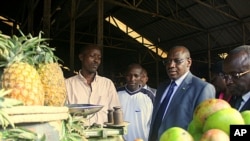The East African Community, an regional bloc that links Burundi, Kenya, Rwanda, Tanzania and Uganda, has grand plans to integrate the five nations' economies and eventually their governments. Business people say if this happens, it could bring prosperity to one of the poorest, most crowded places on earth.
Bart Gasana owns several small businesses in Rwanda, including three dry cleaners. For years he has been buying chemicals for the laundry shops from neighboring Kenya but now he says it is too expensive. It may be cheaper to buy them directly from the U.S.
Officials say a lot of things in East Africa are expensive, or at least more expensive than they have to be, including the price of doing business. Gasana says businesses that rely heavily on transporting items within the region have to swallow enormous costs - beyond the inflated price of fuel.
"People who are dealing in transport still will tell you about road blocks, weigh bridges, monies they are paying right and left - be it official or unofficial - and maybe small bribes here and there to facilitate their way through," said Gasana.
But officials say they hope barriers like these will one day be a thing of the past. Rwandan Minister of the East African Community Monique Mukaruliza says the regional organization is working to implement a common market protocol that would streamline cross-border trade.
She says the protocol is one of four treaties, two of which have already come into force. The first deals with customs, and the countries have already started charging uniform fees. The second is the common market. Mukaruliza says it is intended to guarantee the free movement of people, labor, services and capital, as well as peoples’ right to reside or start a business in any of the partner countries.
Mukaruliza says that although a few things have changed since the common market came into force, most of the provisions of the treaty have not yet turned into action on the ground.
"People have started enjoying all those rights - even if we have not finished to harmonize our laws, or to align the national laws to the common market," said Mukaruliza.
Also on the agenda, but still in the planning phase, is the goal of integrating the countries’ monetary and political systems, including the creation of a common currency and a regional government. Mukaruliza says what she hopes is a "political federation" will erase borders and increase incomes across the region.
But she says, the idea is far from taking off. "People have expressed fears and concerns about the political federation. What we have realized is that people have not yet built trust among themselves. That is why if we implement fully the customs union and the common market, people will interact, people will build trust among themselves," said Mukaruliza.
Gasana, the business owner, says the idea of making East Africa essentially one country would be a dream come true for many business people, but with more than 125 million people, and scores of local languages and ethnicities, this region is far from unified. People in individual nations, he says, first have to start identifying with their own countries before they can identify with a federation.
"They still have issues of cohesion - of feeling like they are one people. Those issues are still there. So when you now open up to an even wider sphere, either those problems would become bigger or, you never know, it could be a solution," said the business owner.
While visiting the markets of Kigali, Rwanda’s central bank governor, Claver Gatete, says regional economic integration is already here. In the future, he says, integration could reduce prices by making regional imports truly priced by the market.
"Almost everything comes from the region - from fish to fruits and vegetables, especially fruits - they are coming from Tanzania. They are coming from Uganda, they are coming from Burundi," said the governor.
Officials warn that true integration could take years, and political integration is still up in the air. But people are already trading across borders, they say, and every step they take towards integration makes life a little easier.
East Africa Talks Togetherness





